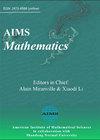麦克斯韦方程组四阶精度时域有限差分法的能量分析
IF 1.8
3区 数学
Q1 MATHEMATICS
引用次数: 0
摘要
本文提出了求解无源无电荷二维麦克斯韦方程组的四阶时域精度ADI-FDTD方法。本文主要对所提出的ADI-FDTD方法进行了能量分析。利用能量法推导了ADI-FDTD方法的数值能量恒等式,并证明了ADI-FDTD方法是近似能量守恒的。与理论能量相比,数值能量有两个摄动项,可以在计算中使用,以保持其近似保能。数值实验验证了所提出的ADI-FDTD方法的性能,验证了理论结果。本文章由计算机程序翻译,如有差异,请以英文原文为准。
Energy analysis of the ADI-FDTD method with fourth-order accuracy in time for Maxwell's equations
In this work, the ADI-FDTD method with fourth-order accuracy in time for the 2-D Maxwell's equations without sources and charges is proposed. We mainly focus on energy analysis of the proposed ADI-FDTD method. By using the energy method, we derive the numerical energy identity of the ADI-FDTD method and show that the ADI-FDTD method is approximately energy-preserving. In comparison with the energy in theory, the numerical one has two perturbation terms and can be used in computation in order to keep it approximately energy-preserving. Numerical experiments are given to show the performance of the proposed ADI-FDTD method which confirm the theoretical results.
求助全文
通过发布文献求助,成功后即可免费获取论文全文。
去求助
来源期刊

AIMS Mathematics
Mathematics-General Mathematics
CiteScore
3.40
自引率
13.60%
发文量
769
审稿时长
90 days
期刊介绍:
AIMS Mathematics is an international Open Access journal devoted to publishing peer-reviewed, high quality, original papers in all fields of mathematics. We publish the following article types: original research articles, reviews, editorials, letters, and conference reports.
 求助内容:
求助内容: 应助结果提醒方式:
应助结果提醒方式:


